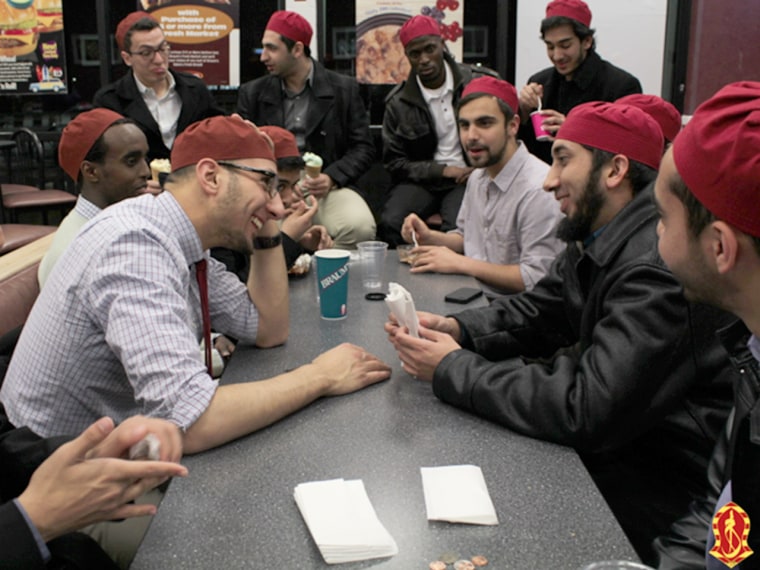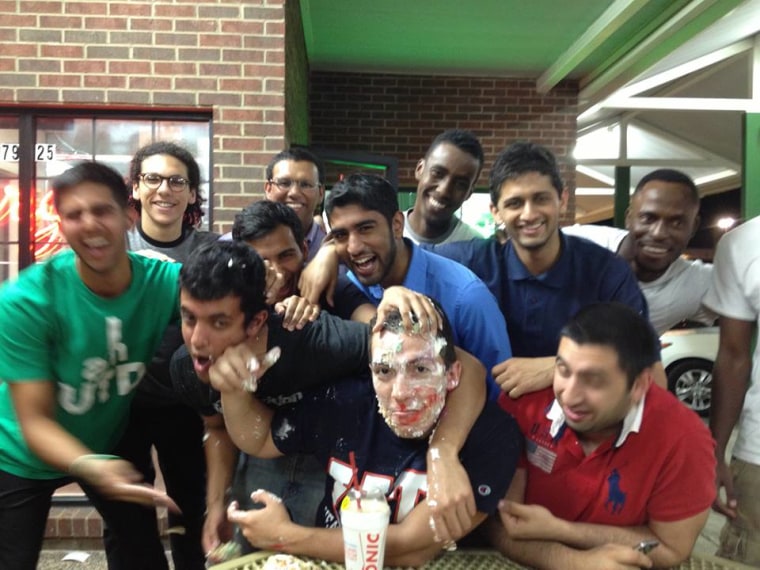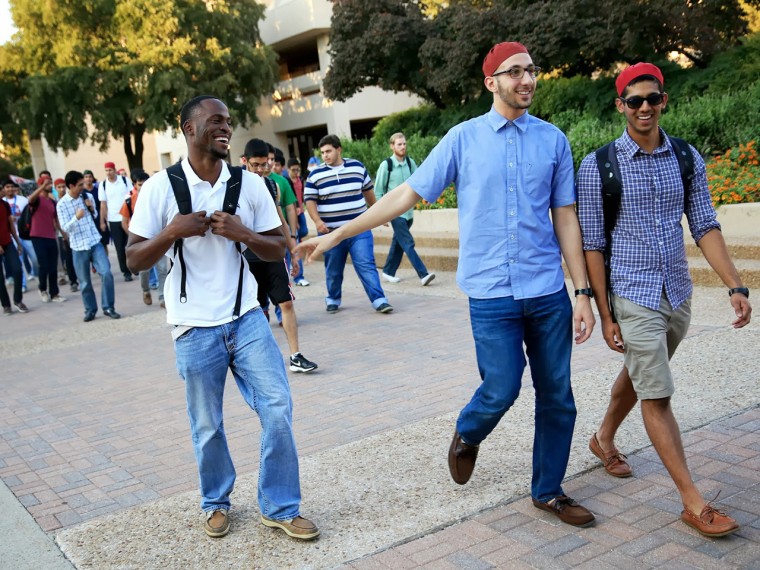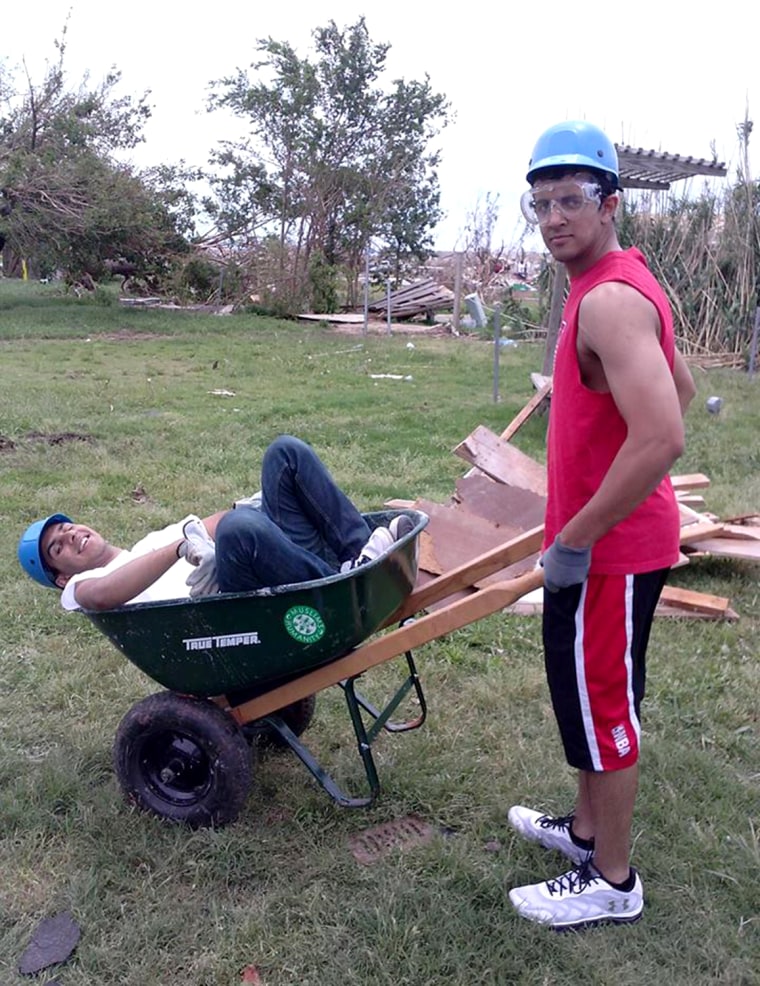
The pledges who rushed Alpha Lambda Mu this week probably experienced the same fun, hijinks and brotherhood found at nearly every other fraternity.
But unlike traditional frat brothers, this group of young men were also reflecting on Islamic traditions that touch their lives daily. They were able to single out current members by their bright red kufi caps. And they were cracking jokes about how the marshmallows they toasted over the bonfire were halal.
Alpha Lambda Mu, also known as Alif Laam Meem, welcomed a group of recruits hoping to join what's believed to be the nation’s first Muslim fraternity, established in February at the University of Texas at Dallas.
A few differences between this group and their stereotypical Greek counterparts are striking. They do not drink. Their social activities often focus on community service. They donate their $100 initiation fee to charity.

“We stay far from what many other social fraternities stereotyped as, including excessive drinking, malignant hazing, and womanizing,” said Ali Mahmoud, the organization’s president and founder. “We provide a comfortable space for young Muslim American men to be themselves.”
Mahmoud, a 19-year-old junior majoring in biology and sociology, sees ALM similar to black and Jewish fraternities that used their organizations as a refuge where they could safely stand up for their beliefs amid like-minded individuals.
“Muslims in America are in a similar position, and our fraternity is fulfilling those needs as well as many more,” he said. “We're paving a new path for Muslims on campus to have an organic, wholesome college experience without having to compromise the values of their religion.”
Mahmoud said the idea of a Muslim fraternity sprung from a joke between him and a childhood friend right before they started college. His friend wanted to join Phi Gamma Delta, a traditional Greek fraternity, an idea that disappointed Mahmoud because of the hard-partying, “Animal House” stereotypes that came to mind — all of them a contradiction of Islamic values.

But Mahmoud was silenced when his friend pointed out the benefits a fraternity provides, like instant friendships and a lifelong network that can last far after graduation.
The two joked about the need for an Islamic alternative, “such as a Muslim fraternity. And that's where it all started,” Mahmoud said.
The Texas chapter is also home to the ALM’s governing body, which is made up of the initial founders. The group typically meets on campus or at each other’s homes, or “wherever our events take us, whether it be at the mosque or the movie theater,” he said.
The group is currently developing its charter and has not decided which national interfraternity council to join. Four additional chapters are in the process of getting established at Cornell University, University of Pennsylvania, University of California, San Diego, and University of Central Florida, but Mahmoud said his group also has received numerous inquiries from other schools.
Mahmoud knows others have thought about starting a Muslim fraternity, but "determination, pure intentions, hard work, strong faith, brotherhood, and a tiny bit of luck" helped his group get one off the ground. While most college campuses offer Muslim student clubs or organizations, a fraternity can provide a special sense of brotherhood.
Alpha Lamdu Mu is the phonetic equivalent to Alif Laam Meem, three Arabic letters at the beginning of several chapters of the Koran. Although they do not make up a word, they are immediately recognizable to Muslims.
The group categorizes itself as a social fraternity — as opposed to a service or cultural one — but ALM members have devoted a significant portion of their meetings on community events. They supported women’s rights at a “men’s rally” against domestic violence. They also gathered one morning to make hundreds of sandwiches they later handed out to homeless people.
Sometimes, their service is more spontaneous. The day after a fertilizer plant exploded in West, Texas, members drove several hours to drop off new pillows, sleeping bags and other supplies at a housing shelter. They also helped with cleanup efforts after a tornado tore through Moore, Okla.
McLain Watson, the group’s faculty sponsor, said he has been inspired by how members work closely behind the scenes, setting up fraternity bylaws, while engaging in various community outreach and still do well academically.

“These are young men who take school seriously, like to have fun, and create innovative ways to serve the community,” said Watson, a professor with the Naveen Jindal School of Management at the University of Texas at Dallas. “Anything that provides a platform for them to join together and achieve a collective impact is something to be celebrated."
The group’s original 17 members, known as the “Kufi Krew” because of the red brimless hats they wear, will soon decide which of the roughly 35 students who “rushed” this week to formally invite back to the group.
All of the potential pledges were Muslim, although the fraternity is open to anyone “interested in learning about our religion or who appreciates our lifestyle and values,” Mahmoud said.
ALM’s goal is to provide an open and nonjudgmental environment of brotherhood.
“We have people who pray five times a day, and others who struggle to pray that often,” he said. “Our biggest thing is sincerity.”
Mahmoud said as someone who has mainly grown up in a post-September 11 nation, he has often felt defensive about being Muslim.
“I've had to constantly debunk myths about my religion and tell people what Islam isn't,” he said.
“Giving young Muslim men a safe space in a fraternity where they can naturally develop who they are … without the fear of being judged or attacked is something that I've seen as an urgent need for college-aged Muslims all around the country.”